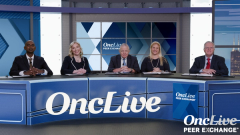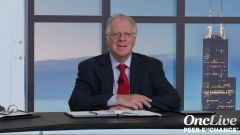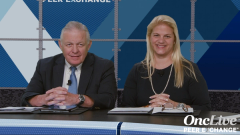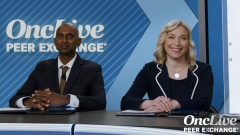
HER2 Dual Blockade in Early Stage HER2+ Breast Cancer
Shared insight on the optimal use of HER2 dual-blockade strategies in patients with early stage HER2+ breast cancer.
Episodes in this series

Transcript:
Andrew Seidman, MD: Bill, perhaps you could share with us how you typically employ dual–HER2 [human epidermal growth factor receptor 2] blockade in the adjuvant setting.
William Gradishar, MD: In the adjuvant setting, if postsurgical patients have met the criteria of the APHINITY trial—patients had T2 lesions, node-positive disease, or both—we’d consider a regimen that contains trastuzumab and pertuzumab with chemotherapy. What we learned from those trials, when the data were first presented, is that many people probably looked at the curves and said that’s a whole lot of treatment for not a lot of light between the curves. You look at the data and get down in a more granular way to determine if there are subsets [of patients] who benefit more than others. With longer follow-up, we have a better guide to where that therapy should be used and who most benefits from it.
Andrew Seidman, MD: Clearly node positive more than node negative, but do you discriminate based on hormone receptor status?
William Gradishar, MD: At the outset, there was some concern that if you were hormone receptor positive, you may not reap the benefits from that approach. But with longer follow-up, we see that both populations gain benefit. I don’t think we’d necessarily avoid using it just because of the hormone receptor status.
Andrew Seidman, MD: We’ll discuss more as we go through the program opportunities for de-escalation of chemotherapy foundation or backbone. In the APHINITY context, do you have a go-to regimen that you use as a foundation for chemotherapy on which to add dual HER2 blockade?
William Gradishar, MD: More recently, based on data from a number of experiences suggesting that the anthracyclines don’t add a whole lot, there’s been a trend to veer away from that both preoperatively and postoperatively. It may be a coastal phenomenon. We’re right in the middle, so we’re not on either side. The general rule has been to give chemotherapy with both agents and, more recently, to avoid an anthracycline. Commonly we use a TCHP [docetaxel, carboplatin, trastuzumab, pertuzumab] regimen as the foundation for that population.
Andrew Seidman, MD: Bill, or perhaps Stephanie, do all your patients have mediports when they’re going for such therapy?
Stephanie Graff, MD: When I use the APT [adjuvant paclitaxel and trastuzumab] regimen, I don’t typically do a mediport. But when I do TCHP [docetaxel, carboplatin, trastuzumab, pertuzumab], I tend to put in a mediport. You could make a case to not use a mediport with TCHP [docetaxel, carboplatin, trastuzumab, pertuzumab]. Just to be clear, when we’re talking about TCHP [docetaxel, carboplatin, trastuzumab, pertuzumab], I typically use docetaxel and carboplatin. We’re using abbreviations, so that’s just for clarity’s sake. I’ll add to Bill’s earlier comment that what anthracycline adds to this regimen is cardiac toxicity. I try too spare patients that when I’m dealing in the HER2+ space.
Andrew Seidman, MD: Tiffany and I, in our institution [Memorial Sloan Kettering Cancer Center], use mediports as a fallback position, not an up-front position. We try to avoid them, but when we’re thinking about a year of HER2-targeted therapy and parenteral therapy that can be onerous for some patients, I can see why central venous access is necessary.
Transcript edited for clarity.








































